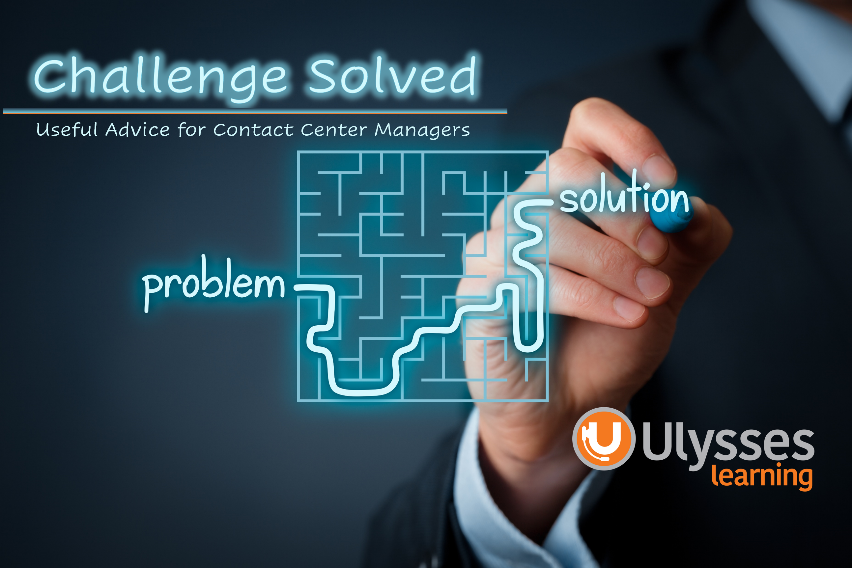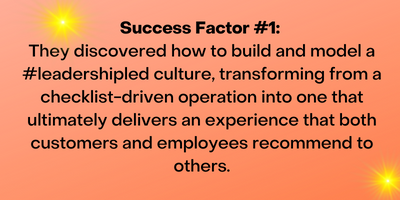
Challenge Solved: Useful Advice for Contact Center Managers
A shrinking labor pool, new and evolving worker preferences, growing complexity in handling customer questions and needs, increasing levels of stress from everyday life, widespread economic uncertainty, fallout from technological advancements such as AI and machine learning…these are realities for many contact center managers today. In tackling this month’s reader question, Dina Vance, Ulysses’ Senior Vice President and Managing Director, North American Operations, shares some of the ways top contact centers are addressing these issues…and even capitalizing on them. Their innovative best practices may surprise you!
Have your question answered in an upcoming Challenge Solved advice column. Email your question to: ChallengeSolved@ulysseslearning.com
Q: What are other contact center leaders doing to deal with the demands of running a business today? I feel like I’m rehiring the same position over and over again and my team is stressed out filling the gaps while tackling what seems like a never-ending stream of new priorities. I’m looking for ideas. Help!
 Our featured expert for this month’s question is:
Our featured expert for this month’s question is:
Dina Vance
Senior Vice President, Managing Director of North American Operations at Ulysses Learning
A: You are not alone! That’s why my first recommendation to you is to take the time to reimagine your contact center. Think about it, we’re all faced with a shrinking labor pool, new and evolving worker preferences, growing complexity in handling customer questions and needs, increasing levels of stress from everyday life, widespread economic uncertainty, fallout from technological advancements such as AI and machine learning. The list goes on and on and yet these are just some of the conditions contact center leaders must successfully navigate each day. I’ve consulted my clients to take a step back and literally reimagine their contact centers so that you not only address these real issues but capitalize on them. Yes, capitalize on them!
I’ve been fortunate to have teamed up with a number of clients with top-performing contact centers that are truly thriving because they looked at both the customer and employee experience with fresh eyes and then implemented tactics that 1) made it easier for customers and employees to work with them; and 2) delivered an experience that both customers and employees recommend to others.
Here are three driving factors behind their success:
 Success Factor #1: They discovered how to build and model a #leadershipled culture, transforming from a checklist-driven operation into one that ultimately delivers an experience that both customers and employees recommend to others.
Success Factor #1: They discovered how to build and model a #leadershipled culture, transforming from a checklist-driven operation into one that ultimately delivers an experience that both customers and employees recommend to others.
We’ve long supported quality initiatives designed to “set the table”, so to speak, to define a quality customer experience and then measure performance accordingly. While measurement consistency and constancy can be a benefit with this more “quality-led” approach, in recent years we’ve helped other contact centers improve customer experience by taking what we call a “leadership-led” approach. This necessitates a shift from an operations-first mindset to a people-first mindset. In a nutshell, #leadershipled is a movement where leaders define the quality experience and set the standard based on customer feedback among other factors, versus quality coming in as a third party responsible for dictating the measures and policing their adherence. In a true leadership-led culture it’s not an us/them proposition. Leaders have the responsibility for and are “all in” to help their team members to deliver the highest possible customer experience while loving what they do. In a leadership-led culture, managers develop the skills to model the behaviors teams need to achieve quality goals and quality team members provide additional support.
Success Factor #2: They learned how to train each team member (supervisors and frontline representatives) to master and support seamless high-quality, customer-experience-building conversations and move from a “freestyle” to a “framework with freedom” approach that not only improves First Call Resolution but dramatically lifts Net Promoter Scores and other leading indicators.
team member (supervisors and frontline representatives) to master and support seamless high-quality, customer-experience-building conversations and move from a “freestyle” to a “framework with freedom” approach that not only improves First Call Resolution but dramatically lifts Net Promoter Scores and other leading indicators.
There’s an interesting phenomenon happening in our contact centers today that was validated in a recent research study we conducted. Here are two of the top findings:
Finding #1: Contact centers now experience a higher percentage of “sensitive” or “emotionally charged” calls.
With AI and other machine-driven technologies handling a growing percentage of the more routine service needs, representatives are receiving more calls that are more sophisticated in nature. Additionally, they are taking calls from customers who are frustrated that they have to call in to the contact center and can’t have their issues resolved electronically. These calls are requiring a different level of finesse when it comes to active listening, taking ownership, caring enough to ask the question behind the question, and thinking of solutions that add value.
The research showed that having a conversation strategy to support these calls is essential; however, the key is to ensure representatives possess the ability to “flex” to meet the customer where they are in the conversation flow. This slight adjustment has a positive effect on both the customer experience and performance measures. Another benefit is that when this element of flex is added effectively into the conversation flow, team members feel even more empowered and excited about their work.
Finding #2: Certain contact center representatives find it easier to transform call or conversation strategies into their own expression of service excellence, activating their emotional intelligence (EQ) or judgment.
There are several factors that come into play, with the more prevalent being the representative’s experience level, age, attitude, and performance level. While emotional intelligence (EQ) comes naturally to some, we found that certain contact center representatives benefitted from an alternative approach to help build confidence in using their customer-experience-building tools. We have spent the past two years testing this approach of infusing EQ into the application of an eight-step Conversation Strategy, and the outcomes have showed positive results with improved CSAT, FCR, and NPS. For those representatives needing an EQ boost, the additional learning through targeted campaigns and coaching helps make it even easier and more enjoyable for them to personalize and activate the strategies in a way that makes sense to them, and in doing so they become self-managers.
 Success Factor #3: They show frontline leaders how to activate a robust coaching practice so that team members learn how to be their own “self-manager” and never have to feel micromanaged again!
Success Factor #3: They show frontline leaders how to activate a robust coaching practice so that team members learn how to be their own “self-manager” and never have to feel micromanaged again!
If leaders are not equipped to coach and show their team the way forward to deliver a convenient, seamless customer experience, contact center teams will be stuck in a cycle of training initiatives that produce lackluster results. Smart, targeted coaching is the essential ingredient to a contact center teams’ ability to reimagine operations in 2022 and beyond.
We’ve been very fortunate to have collaborated with clients to build a culture of coaching designed not to micromanage but to develop each team member into their own “self-manager.” These organizations focus their energy on facilitating leadership-led coaching calibrations versus calibrations by quality team members only. They implement high-impact support initiatives to improve call scoring and consistency. They also use “Governance Panels” to build respect and understanding for associates.
I certainly agree that the model for contact center excellence is evolving. What has become clear is that a more advanced, sophisticated, and reimagined contact center experience is an imperative for excellence. And in a world where artificial intelligence and machine learning applications are proliferating, quality conversations between customers and associates take on a whole new level of importance and will continue to take center stage. I hope you found this response helpful, and, please reach out if you’d like to discuss these ideas further!
Learn more. Contact us or reach out to your consultant today!
About Dina Vance
Senior Vice President, Managing Director of North American Operations at Ulysses Learning
In her current capacity with Ulysses Learning, Dina is responsible for the day-to-day operations of the company and also serves as the chief client relationship executive, working with Fortune 100 clients and other progressive organizations to redefine the way customers are cared for. Under her leadership, Ulysses has become well known for its work in transforming customer service, sales and coaching cultures through the development of emotional intelligence or “EQ,” enabling reps to confidently, consistently and expertly handle every call. The company has special expertise in serving the insurance, utilities, and financial services industries.
Before joining Ulysses in 1999, Dina was responsible for the ground-level startup of two contact centers which led to her accepting a role as call center lead consultant and division manager for an international bank training organization.
Dina can be reached on LinkedIn or at dvance@ulysseslearning.com; for more details on Ulysses Learning visit www.ulysseslearning.com.
Challenge Solved! is sponsored by:
 Ulysses Learning was founded in 1995 as a joint venture with Northwestern University’s world renown Learning Sciences department. Since then, Ulysses continued focus on research and development brings clients new, innovative enhancements to its industry-leading training and performance improvement solutions. Contact centers achieve profound business results, ahead of schedule, with Ulysses Learnings’ artful blend of patented simulation-based e-learning, facilitated exercises, coaching, and tools, that redefine the way customers are cared for and transform customer service, sales, and coaching cultures. Ulysses has one of the only training systems proven to build EQ@Work, enabling reps to develop skills to empathize with others, build stronger customer bonds, and improve team dynamics with confidence, consistency, and excellence.
Ulysses Learning was founded in 1995 as a joint venture with Northwestern University’s world renown Learning Sciences department. Since then, Ulysses continued focus on research and development brings clients new, innovative enhancements to its industry-leading training and performance improvement solutions. Contact centers achieve profound business results, ahead of schedule, with Ulysses Learnings’ artful blend of patented simulation-based e-learning, facilitated exercises, coaching, and tools, that redefine the way customers are cared for and transform customer service, sales, and coaching cultures. Ulysses has one of the only training systems proven to build EQ@Work, enabling reps to develop skills to empathize with others, build stronger customer bonds, and improve team dynamics with confidence, consistency, and excellence.
Ulysses Learning is a multi-year recipient of the Gold Stevie© Award for best contact center customer service training.
Begin your contact center transformation now. Phone 800-662-4066 or visit ulysseslearning.com to get started.